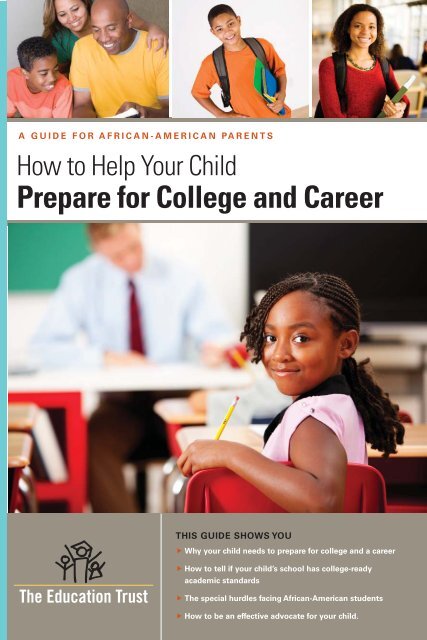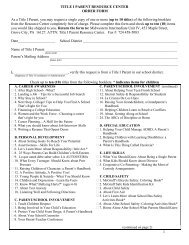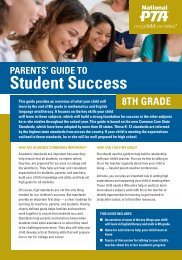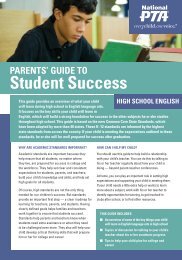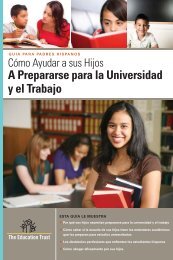How to Help Your Child Prepare for College and Career
How to Help Your Child Prepare for College and Career
How to Help Your Child Prepare for College and Career
Create successful ePaper yourself
Turn your PDF publications into a flip-book with our unique Google optimized e-Paper software.
HELP YOUR CHILD PREPARE FOR COLLEGE AND A CAREERConsider this: In 1950, 60 percent of jobs were filled by unskilled workers, but by 2005,just 14 percent of jobs fell in<strong>to</strong> this category. Today, even fewer jobs exist <strong>for</strong> people withouteducation beyond high school. What’s more, many entry-level jobs that don’t requirea college degree require the same skills all colleges require—an ability <strong>to</strong> speak <strong>and</strong> writeclearly—<strong>and</strong> many occupations that may not require a bachelor’s degree neverthelessdem<strong>and</strong> high-level math <strong>and</strong> science skills.For example, plumbers <strong>and</strong> construction workers nowadays need four or five years ofapprenticeship or training. They need <strong>to</strong> be able <strong>to</strong> underst<strong>and</strong> complex technical manuals<strong>and</strong> solve problems that often involve applying skills in mathematics, physics, or statistics.<strong>College</strong> graduates have access <strong>to</strong> many more jobs <strong>and</strong> are less likely <strong>to</strong> be unemployedthan those with a high school diploma. Young people with college degrees are more likely<strong>to</strong> get a job with such benefits as health insurance, a retirement fund, paid vacations, <strong>and</strong>disability insurance. And according <strong>to</strong> the latest Census Bureau data, college grads onaverage earn far more annually as well:• <strong>College</strong> diploma: $56,788• High school diploma: $31,071• No high school diploma: $20,873Over a lifetime, the difference in salary between a high school graduate <strong>and</strong> a collegegraduate amounts <strong>to</strong> nearly $1 million. So it just makes good sense <strong>to</strong> help your childprepare now <strong>for</strong> college <strong>and</strong> a career.IS YOUR CHILD’S SCHOOL FOCUSED ON SUCCESS BEYOND HIGH SCHOOL?Today, many schools have exactly the right goal: educating all students <strong>for</strong> college <strong>and</strong> acareer. These schools have high expectations. They hire the best teachers they can find.They’ve developed rigorous curricula <strong>and</strong> offer dem<strong>and</strong>ing courses. And teachers give studentschallenging assignments. No one makes excuses <strong>for</strong> low achievement; instead, principals<strong>and</strong> teachers work hard <strong>to</strong> give each student what he or she needs <strong>to</strong> succeed.On the other h<strong>and</strong>, some schools talk a good game but are not reallyproviding the best possible education. These schools givefancy names <strong>to</strong> simple courses that don’t prepare kids<strong>for</strong> college. They rate all their teachers “highquality,” not just the very best ones. Andthey allow students <strong>to</strong> take a hodgepodgeof classes, not a well-planned sequenceof courses that colleges expect students <strong>to</strong>master.No matterwhere you live,
you need <strong>to</strong> know the courses that can help your child get in<strong>to</strong> college—<strong>and</strong> meet academicexpectations once they enroll. Some states require all students <strong>to</strong> take college-prepcourses <strong>to</strong> graduate, but many have mismatching requirements <strong>for</strong> high school graduation<strong>and</strong> college admission.Remember, research clearly shows that the best predic<strong>to</strong>r of college success is a rigoroushigh school program of study. So as you help your child explore options <strong>for</strong> college, youmight find the college’s catalogue or Web site lists courses like this:Content Area Common courses <strong>for</strong> college admission <strong>and</strong> successEnglish (4)Four years of EnglishMath (4)Algebra 1, Geometry, Algebra 2, <strong>and</strong> high-level math in 12th gradeScience (3) At least three years with labs (typical courses include Biology, Chemistry,Physics)Social Studies (3) Typical courses include World His<strong>to</strong>ry, American His<strong>to</strong>ry, Civics, EconomicsWorld Language (2) At least two years of a second language in sequence (i.e., Spanish 1, Spanish 2)Speak with your child’s principal <strong>and</strong> teachers <strong>to</strong> find out whether the school reallyoffers a college <strong>and</strong> career-ready curriculum. And make sure your child enrolls in therequired classes <strong>and</strong> makes steady progress in earning the right credits needed <strong>to</strong> get in<strong>to</strong>college—<strong>and</strong> succeed once there.AFRICAN-AMERICAN STUDENTS FACE SOME TOUGH CHALLENGESGiven lingering racism in this country, you won’t be surprised <strong>to</strong> learn this: African-Americanstudents are much less likely than white students <strong>to</strong> have the most qualified teachers—the ones with the most experience <strong>and</strong> greatest expertise in the subject matter.And many African-American students go <strong>to</strong> schools that do not even offer some of thehigh-level courses necessary <strong>for</strong> admission <strong>to</strong> the best colleges. This is a terrible injustice.The tragic consequence is that African-American graduates are nearly half as likely <strong>to</strong> finishhigh school with a rigorous academic diploma as white students.The best schools encourage all students <strong>to</strong> aspire <strong>to</strong> the most challenging courses. Thenthey provide plenty of academic support <strong>for</strong> those struggling with assignments, <strong>and</strong> theydon’t lower st<strong>and</strong>ards. This support includes concentrated help on specific skill sets duringthe school day <strong>and</strong> extended-day options.HOW YOU CAN BE AN EFFECTIVE ADVOCATE FOR YOUR CHILDUntil every school gives all students an education that prepares them <strong>for</strong> college <strong>and</strong> acareer, African-American parents will have <strong>to</strong> fight <strong>for</strong> their children’s future, class by class,teacher by teacher, <strong>and</strong> school by school. <strong>Your</strong> child deserves nothing less.A strong high school education is a legacy that lasts, a gift that can propel your child ona journey of independence. When equipped with the learning <strong>to</strong>day’s world dem<strong>and</strong>s, ouryoung people can begin <strong>to</strong> truly live their dreams.
HOW YOU CAN HELP IMPROVEYOUR CHILD’S EDUCATIONSet clear expectations• Let your child know you expect him or her <strong>to</strong> go <strong>to</strong> college—nothing less.Be an advocate at school• Meet with your child’s teachers <strong>and</strong>counselor. Together, map a course of studythat prepares your child <strong>for</strong> college. Ask<strong>to</strong> see your child’s schedule <strong>and</strong> transcript<strong>to</strong> be sure your child is taking collegeprepcourses, including honors, AdvancedPlacement, <strong>and</strong> dual enrollment if available.It is never <strong>to</strong>o early <strong>to</strong> plan <strong>for</strong> college—asearly as middle school—<strong>and</strong> it is important<strong>to</strong> let the school know you expect your child<strong>to</strong> attend college.• Get a copy of the state academicst<strong>and</strong>ards <strong>for</strong> each subject, <strong>and</strong> makesure you know what your child should belearning. Look at your child’s homework <strong>and</strong>ask <strong>for</strong> a syllabus or outline of the work yourchild will receive during the year. If you’realarmed after comparing the state st<strong>and</strong>ardswith the syllabus or outline or the homework,discuss your concerns with the teacher <strong>and</strong>principal. For more in<strong>for</strong>mation, see ourhomework guide at www.edtrust.org.• If your child struggles in a specifi c subject,ask the teacher or principal about a plan<strong>to</strong> help your child learn. (Beware if theylack a plan or tell you not <strong>to</strong> worry.) Insistyour child receive appropriate extra helpthrough tu<strong>to</strong>ring, after-school support, <strong>and</strong>lunch-time support—whatever it takes.• Check with the principal <strong>to</strong> find outwhether your child’s teachers arecertified <strong>to</strong> teach a specifi c subject <strong>and</strong>their number of years of experience. If you’redissatisfi ed, ask <strong>for</strong> a different teacher.• Ask the principal <strong>for</strong> data <strong>to</strong> fi nd out howthe school’s African-American students scoreon tests, how many graduate, <strong>and</strong> how manygo on <strong>to</strong> college. If your child’s school isdoing poorly, reach out <strong>to</strong> other parents <strong>and</strong>express your concerns collectively.Be an advocate at home• Find out the high school courserequirements <strong>for</strong> competitive four-yearcolleges that interest you <strong>and</strong> your teenager.Check the admissions page on the college’sWeb site <strong>for</strong> this in<strong>for</strong>mation as well aswww.collegeboard.org. And find out whetheryour state requires any extra courses<strong>for</strong> graduation (such as health, physicaleducation, <strong>and</strong> art).• Learn all you can about collegefinancial aid. Students <strong>and</strong> parents oftenoverestimate the costs <strong>and</strong> underestimatethe amount of available financial aid. Use theFAFSA4caster <strong>to</strong> receive an early estimate ofhow much federal student aid your child iseligible <strong>for</strong>: https://fafsa4caster.ed.gov.• Find out which colleges offer your childthe best chances of success. Visit <strong>College</strong>Results Online, www.collegeresults.org, <strong>to</strong>compare different colleges’ graduation rates<strong>and</strong> <strong>to</strong> find those with a strong track recordof graduating African-American students.• Find outside help <strong>to</strong> navigate thecollege admissionsprocess. Manylibraries, communitycenters, <strong>and</strong> collegesthemselves offer help<strong>to</strong> students <strong>and</strong>parents,includinghelp fillingout collegeapplication<strong>and</strong> fi nancial aid<strong>for</strong>ms.
BECOME AN INVOLVED PARENT.YOU CAN MAKE A DIFFERENCE FOR YOUR CHILD.ABOUT THE EDUCATION TRUSTThe Education Trust promotes high academic achievement <strong>for</strong> all students atall levels—pre-kindergarten through college. We work alongside educa<strong>to</strong>rs,parents, policymakers, <strong>and</strong> community <strong>and</strong> business leaders across the country<strong>to</strong> help trans<strong>for</strong>m schools <strong>and</strong> colleges in<strong>to</strong> institutions that serve all studentswell. Lessons learned in these ef<strong>for</strong>ts, <strong>to</strong>gether with unflinching data analyses,shape our state <strong>and</strong> national policy agendas. Our goal is <strong>to</strong> close the gapsin opportunity <strong>and</strong> achievement that consign far <strong>to</strong>o many young people—especially those who are black, Latino, American Indian, or from low-incomefamilies—<strong>to</strong> lives on the margins of the American mainstream.This publication is made possible through the generous suppor<strong>to</strong>f the Annie E. Casey Foundation.1250 H STREET, N.W, SUITE 700, WASHINGTON, D.C. 20005P 202/293-1217 F 202/293-2605 WWW.EDTRUST.ORG


